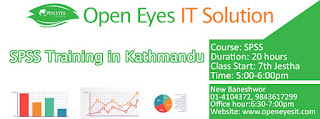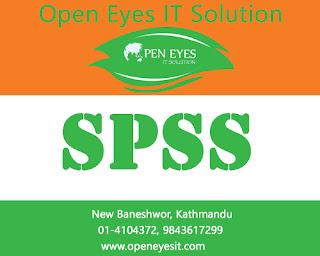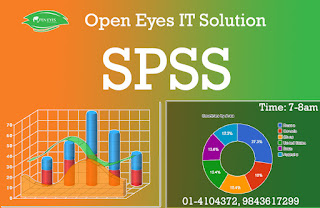 |
| SPSS Training in Kathmandu Nepal |
In this course, you will learn about the principles and practice of data mining using the CRISP-DM methodology. The course structure follows the stages of a typical data-mining project, from collecting data, to data exploration, data transformation, and modeling to effective interpretation of the results. You will learn about modeling as well as the basics of how to read, prepare, and explore data with IBM SPSS Modeler.
 |
| SPSS Training in Kathmandu Nepal |
1.Introduction to Data Mining
- Two applications of data mining
- Stages of the CRISP-DM process model
- Successful data-mining projects and the reasons why projects fail
- Skills needed for data mining
 |
| SPSS Training in Kathmandu Nepal |
2.Working with IBM SPSS Modeler
- MODELER user-interface
- Work with nodes
- Run a stream or a part of a stream
- Open and save a stream
- Use the online Help
3.Creating a Data-Mining Project
- Basic framework of a data-mining project
- Build a model
- Deploy a model
 |
| SPSS Training in Kathmandu Nepal |
4.Collecting Initial Data
- Concepts "data structure", "unit of analysis", "field storage" and "field measurement level"
- Import Microsoft Excel files
- Import IBM SPSS Statistics files
- Import text files
- Import from databases
- Export data to various formats
 |
| SPSS Training in Kathmandu Nepal |
5.Understanding the Data
- Audit the data
- How to check for invalid values
- Take action for invalid values
- How to define blanks
 |
| SPSS Training in Kathmandu Nepal |
6.Setting the Unit of Analysis
- Set the unit of analysis by removing duplicate records
- Set the unit of analysis by aggregating records
- Set the unit of analysis by expanding a categorical field into a series of flag fields
7.Integrating Data
- Integrate data by appending records from multiple datasets
- Integrate data by merging fields from multiple datasets
- Sample Records
 |
| SPSS Training in Kathmandu Nepal |
8.Deriving and Reclassifying Fields
- Use the Control Language for Expression Manipulation (CLEM
- Derive new fields
- Reclassify field values
9.Identifying Relationships
- Examine the relationship between two categorical fields
- Examine the relationship between a categorical field and a continuous field
- Examine the relationship between two continuous fields
 |
| SPSS Training in Kathmandu Nepal |
10.Introduction to Modeling
- List three modeling objectives
- Use a classification model
- Use a segmentation model
No comments:
Post a Comment